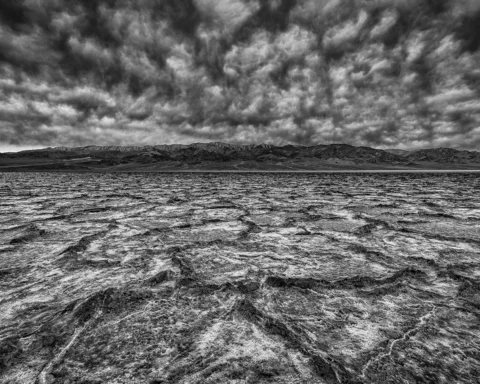Photo: Stokksness (Vestrahorn), Near Höfn. Iceland. ©2017 R. John Anderson
“And who of you by being worried can add a single hour to his life? …
So do not worry about tomorrow; for tomorrow will care for itself.
Each day has enough trouble of its own.” – Matthew 6:27, 34
¿Quién de ustedes, por ansioso que esté, puede añadir una hora al curso de su vida? …
Por tanto, no se preocupen por el día de mañana; porque el día de mañana se cuidará de sí mismo. Bástenle a cada día sus propios problemas. – Mateo 6:27, 34
The “natural man,” which is still in us even after we are born again (1Co 2:14; Rom 7:23), tends to have much anxiety centered around care and concern for the material things “of this world.”[1], [2] Notice that we tend to worry endlessly about things we want, which are not always what we need.[3] It is very likely that you also spend a lot of time and energy worrying about things that will never happen and things that are completely out of your control.
Scripture tells us that a Christian is not supposed to worry and obsess about where their food, clothing, or shelter will come from, nor even about life itself (Mat 6:25–34; Luk 12:22–32; cf. 1Ti 6:17; Php 4:19). We see it written:
“For this reason I say to you, do not be worried about your life, as to what you will eat or what you will drink; nor for your body, as to what you will put on. Is not life more than food, and the body more than clothing? Look at the birds of the air, that they do not sow, nor reap nor gather into barns, and yet your heavenly Father feeds them. Are you not worth much more than they? And who of you by being worried can add a single hour to his life? And why are you worried about clothing? Observe how the lilies of the field grow; they do not toil nor do they spin, yet I say to you that not even Solomon in all his glory clothed himself like one of these. But if God so clothes the grass of the field, which is alive today and tomorrow is thrown into the furnace, will He not much more clothe you? You of little faith! Do not worry then, saying, ‘What will we eat?’ or ‘What will we drink?’ or ‘What will we wear for clothing?’ For the Gentiles eagerly seek all these things; for your heavenly Father knows that you need all these things. But seek first His kingdom and His righteousness, and all these things will be added to you. So do not worry about tomorrow; for tomorrow will care for itself. Each day has enough trouble of its own.” – Mat 6:25–34 (cf. Luk 12:22–32)
“Ask, and it will be given to you; seek, and you will find; knock, and it will be opened to you. For everyone who asks receives, and he who seeks finds, and to him who knocks it will be opened. Or what man is there among you who, when his son asks for a loaf, will give him a stone? Or if he asks for a fish, he will not give him a snake, will he? If you then, being evil, know how to give good gifts to your children, how much more will your Father who is in heaven give what is good to those who ask Him!” – Mat 7:7–11
And my God will supply all your needs according to His riches in glory in Christ Jesus. – Php 4:19
Every good thing given and every perfect gift is from above, coming down from the Father of lights, with whom there is no variation or shifting shadow. – Jas 1:17
Jesus explicitly tells us not to have undue concern about our basic needs—God will provide those for us because He knows what we need, even before we ask him (Mat 6:8).[4] However, please note that I said worry and obsess because Scripture elsewhere tells us (Psa 119:160) the following:
- A Christian is not called to be idle, lazy, or sloppy but to be diligent in all things. We should take and make all proper and prudent steps in planning and preparing for tomorrow, ourselves, and our families (Pro 6:6–11; 21:31; 22:29; 2Th 3:6–15; 1Ti 5:4, 8);
- We are to work for our sustenance (living, food, etc.; Act 18:3; 2Th 3:6–15; Pro 22:29);
- We are to provide for our families (1Ti 5:4, 8); and
- We should generally engage in proper planning and preparation for the future (Pro 6:6–11; 21:31). If you are not doing everything you can to plan and prepare for things ahead of time, you may actually be “putting the Lord to the test” (see Mat 4:7; Luk 4:12; Deu 6:16).[5]
We must, therefore, find the right balance between being diligent and prudently preparing for tomorrow while also being content with what we have. Matthew Henry writes on Matthew 6:25–34:[6]
There is scarcely any one sin[7] against which our Lord Jesus more largely and earnestly warns his disciples, or against which he arms them with more variety of arguments, than the sin of disquieting, distracting, distrustful cares about the things of life, which are a bad sign that both the treasure and the heart are on the earth; and therefore, he thus largely insists upon it. Here is,
The prohibition laid down. It is the counsel and command of the Lord Jesus, that we take no thought about the things of this world; I say unto you. He says it as our Lawgiver, and the Sovereign of our hearts; he says it as our Comforter, and the Helper of our joy. What is it that he says? It is this, and he that hath ears to hear, let him hear it. Take no thought for your life, nor yet for your body (Mat. 6:25). Take no thought, saying, What shall we eat? (Mat. 6:31) and again (Mat. 6:34), Take no thought, mē merimnate—Be not in care. As against hypocrisy, so against worldly cares, the caution is thrice repeated, and yet no vain repetition: precept must be upon precept, and line upon line, to the same purport, and all little enough; it is a sin which doth so easily beset us. It intimates how pleasing it is to Christ, and of how much concern it is to ourselves, that we should live without carefulness. It is the repeated command of the Lord Jesus to his disciples, that they should not divide and pull in pieces their own minds with care about the world. There is a thought concerning the things of this life, which is not only lawful, but duty, such as is commended in the virtuous woman. See Pro. 27:23. The word is used concerning Paul’s care of the churches, and Timothy’s care for the state of souls, 2 Cor. 11:28; Php. 2:20.
But the thought here forbidden is,
A disquieting, tormenting thought, which hurries the mind hither and thither, and hangs it in suspense; which disturbs our joy in God, and is a damp upon our hope in him; which breaks the sleep, and hinders our enjoyment of ourselves, of our friends, and of what God has given us.
A distrustful, unbelieving thought. God has promised to provide for those that are his all things needful for life as well as godliness, the life that now is, food and a covering: not dainties, but necessaries. He never said, “They shall be feasted,” but, “Verily, they shall be fed.” Now an inordinate care for time to come, and fear of wanting those supplies, spring from a disbelief of these promises, and of the wisdom and goodness of Divine Providence; and that is the evil of it. As to present sustenance, we may and must use lawful means to get it, else we tempt God; we must be diligent in our callings, and prudent in proportioning our expenses to what we have, and we must pray for daily bread; and if all other means fail, we may and must ask relief of those that are able to give it. He was none of the best of men that said, To beg I am ashamed (Luke 16:3); as he was, who (Luke 16:21) desired to be fed with the crumbs; but for the future, we must cast our care upon God, and take no thought, because it looks like a jealousy of God, who knows how to give what we want when we know not now to get it. Let our souls dwell at ease in him! This gracious carelessness is the same with that sleep which God gives to his beloved, in opposition to the worldling’s toil, Psa. 127:2.
Leo Boles writes on Matthew 6:30–32:[8]
But if God doth so clothe the grass of the field.—The point here is that God’s wonderful providence clothes the lilies with their beauty and even the short-lived grass of the field, so he will take care of his disciples. Every kind of herb on earth is a product of God’s power and care; he gives to them their different shades, tints, and hues of color; these are far inferior to man; will he not care for man who is so superior to these things? “Shall he not much more clothe you, O ye of little faith?” He will provide such raiment as his disciples may need for their service to him. God will care for his people. But how? Does he forbid sowing and reaping? It is by our diligent sowing and careful reaping that he cares for us. “O ye of little faith.” We have a God who can supply us with all the necessary things of life, and he has promised to do so; hence we should trust him for these things. It is a lack of faith in God when we are overanxious about these material things. We should not be like the Gentiles who scarcely know God and who are anxious about the material things of this life. We should remember that our heavenly Father knows how great and real are our needs for food, clothing, and shelter, and he is good enough to supply them. We do not expect the Gentiles or heathen to trust God for these material blessings, but we do expect his children to trust him for them. He knows our needs and in his own way will supply them. He is wise enough to know our needs, good enough to supply them, and powerful enough to do so; furthermore, he has promised to do this; hence we can trust him.
We can also see how the Lord provided for the disciples when they were sent out (Luk 10:1–20). Matthew Henry further writes:[9]
He [Jesus] appeals to them concerning what had been, Luke 22:35. He had owned that they had been faithful servants to him, Luke 22:28. Now he expects, at parting, that they should acknowledge that he had been a kind and careful Master to them ever since they left all to follow him: When I sent you without purse, lacked you anything?
(1.) He owns that he had sent them out in a very poor and bare condition, barefoot, and with no money in their purses, because they were not to go far, nor be out long; and he would thus teach them to depend upon the providence of God, and, under that, upon the kindness of their friends. If God thus send us out into the world, let us remember that better than we have thus begun low.
(2.) Yet ye will have them own that, notwithstanding this, they had lacked nothing; they then lived as plentifully and comfortably as ever; and they readily acknowledged it: “Nothing, Lord; I have all, and abound.” Note,
[1.] It is good for us often to review the providences of God that have been concerning us all our days, and to observe how we have got through the straits and difficulties we have met with.
[2.] Christ is a good Master, and his service a good service; for though his servants may sometimes be brought low, yet he will help them; and though he try them, yet will he not leave them. Jehovah-jireh.
[3.] We must reckon ourselves well done by, and must not complain, but be thankful, if we have had the necessary supports of life, though we have had neither dainties nor superfluities, though we have lived from hand to mouth, and lived upon the kindness of friends. The disciples lived upon contribution, and yet did not complain that their maintenance was precarious, but owned, to their Master’s honour, that it was sufficient; they had wanted nothing.
UNDERSTANDING LIFE ABUNDANTLY
Additionally, we see it written:
“The thief comes only to steal and kill and destroy; I came that they may have life, and have it abundantly.” – Joh 10:10
Now to Him who is able to do far more abundantly beyond all that we ask or think, according to the power that works within us, to Him be the glory in the church and in Christ Jesus to all generations forever and ever. Amen. – Eph 3:20–21
Those verses are often misunderstood; they do not mean a Christian will have an abundance in material things—that is beyond crystal clear by examining the lives of the apostles, early church saints down throughout history, and even Jesus Himself.[10] Moreover, Jesus never promised those who follow Him a life of ease, contentment, and luxury; in fact, quite the opposite is stated in Scripture (2Ti 3:12; Joh 12:25; 16:33; Mat 10:22, 34–39; 16:24; 24:9; Mar 8:34; 13:13; Luk 9:23; 21:17). So there appears to be much more of a spiritual aspect to this “abundance” than material, and what God means by having life “abundantly” isn’t the same as what the world thinks it means as they try to understand it from a fleshly, material, worldly perspective.
God has simply assured us that our basic needs for food, shelter, and clothing will be met, but even those could be quite meager at times.[11], [12] We see that none of the apostles starved to death, even though they were without food for periods of time, in the cold, sleepless, locked up in prisons, and so on. Lastly, understand that God may not give you some material things specifically because He cares for you and is looking out for your eternal well-being (Mat 19:23–24).
WORRYING CHANGES NOTHING
I want to add one final note for this chapter. We must simply accept that some things are completely out of our control—in particular, other people’s actions. Moreover, the thing about worrying is that it doesn’t actually change anything, so why do it? It’s a complete waste of time and energy. For example, worrying about what others might or might not do does absolutely nothing whatsoever to actually alter their behavior and actions toward you (or even in general). We must instead trust that God, who sees all things, is aware of what is going on, and then we can rest in the promises He has given us in Scripture. So, brother or sister in Christ (myself also), let us fully trust that the Lord knows what we need and that He has promised to provide. Let us not succumb to anxiety and worry about our needs.
CHAPTER PRAYER
Father in heaven, thank You for making Your Word available to us in ways that were never possible before in human history. Thank You for the wisdom, teaching, and instruction that Your Word imparts. Thank You also for Your lovingkindness and faithfulness in all things. Please help me study and meditate on Your Word each day so that my delight is in the Law of the Lord and the things which are above, in heaven, where You are. Help me to really take these words to heart, knowing that You are a God of truth who never, ever lies. Even when things don’t seem to be going well, I can still find assurance, comfort, hope, and peace in Your promises, all while knowing that You are a good and loving Father. I pray all to the glory of God. Amen.
[1] See the chapter “The Gospel of the Grace of God” for “of this world” verse references.
[2] See also the chapter “Seek the Things Above.”
[3] See also the chapter “Understanding Needs versus Wants.”
[4] Please note, however, that Jesus promised you food, shelter, and clothing, not a Ferrari sports car, a luxury yacht, and a Learjet!
[5] See also the chapter “Preparing the Horse for Battle.”
[6] Matthew Henry, Exposition of the Old and New Testaments (London: James Nisbett & Co., 1706–1710/1721).
[7] Yes, it is actually a sin to be excessively worried about these things.
[8] H. Leo Boles, New Testament Commentary: A Commentary on the Gospel According to Matthew. (Nashville, TN: GOSPEL ADVOCATE Company, 1987), 169-170.
[9] Matthew Henry, Exposition of the Old and New Testaments.
[10] For instance, see the chapter “The Sufferings of Paul.”
[11] See also the chapter “Understanding Needs versus Wants.”
[12] See also Wayne Jackson, “I’m a Good Christian. So Why Am I Sick and Poor?” Christian Courier, https://christiancourier.com/articles/im-a-good-christian-so-why-am-i-sick-and-poor.






